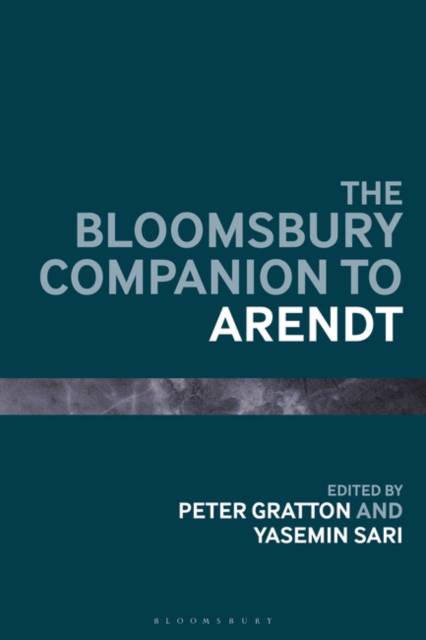
- Retrait gratuit dans votre magasin Club
- 7.000.000 titres dans notre catalogue
- Payer en toute sécurité
- Toujours un magasin près de chez vous
- Retrait gratuit dans votre magasin Club
- 7.000.0000 titres dans notre catalogue
- Payer en toute sécurité
- Toujours un magasin près de chez vous
The Bloomsbury Companion to Arendt
373,45 €
+ 746 points
Description
Hannah Arendt's (1906-1975) writings, both in public magazines and in her important books, are still widely studied today. She made original contributions in political thinking that still astound readers and critics alike. The subject of several films and numerous books, colloquia, and newspaper articles, Arendt remains a touchstone in innumerable debates about the use of violence in politics, the responsibility one has under dictatorships and totalitarianism, and how to combat the repetition of the horrors of the past.
The Bloomsbury Companion to Arendt offers the definitive guide to her writings and ideas, her influences and commentators, as well as the reasons for her lasting significance, with 66 original essays taking up in accessible terms the myriad ways in which one can take up her work and her continuing importance. These essays, written by an international set of her best readers and commentators, provides a comprehensive coverage of her life and the contexts in which her works were written. Special sections take up chapters on each of her key writings, the reception of her work, and key ways she interpreted those who influenced her. If one has come to Arendt from one of her essays on freedom, or from yet another bombastic account of her writings on Adolph Eichmann, or as as student or professor working in the field of Arendt studies, this book provides the ideal tool for thinking with and rediscovering one of the most important intellectuals of the past century. But just as importantly, contributors advance the study of Arendt into neglected areas, such as on science and ecology, to demonstrate her importance not just to debates in which she was well known, but those touched off only after her death. Arendt's approaches as well as her concrete claims about the political have much to offer given the current ecological and refugee crises, among others. In sum, then, the Companion provides a tool for thinking with Arendt, but also for showing just where those thinking with her can take her work today.
The Bloomsbury Companion to Arendt offers the definitive guide to her writings and ideas, her influences and commentators, as well as the reasons for her lasting significance, with 66 original essays taking up in accessible terms the myriad ways in which one can take up her work and her continuing importance. These essays, written by an international set of her best readers and commentators, provides a comprehensive coverage of her life and the contexts in which her works were written. Special sections take up chapters on each of her key writings, the reception of her work, and key ways she interpreted those who influenced her. If one has come to Arendt from one of her essays on freedom, or from yet another bombastic account of her writings on Adolph Eichmann, or as as student or professor working in the field of Arendt studies, this book provides the ideal tool for thinking with and rediscovering one of the most important intellectuals of the past century. But just as importantly, contributors advance the study of Arendt into neglected areas, such as on science and ecology, to demonstrate her importance not just to debates in which she was well known, but those touched off only after her death. Arendt's approaches as well as her concrete claims about the political have much to offer given the current ecological and refugee crises, among others. In sum, then, the Companion provides a tool for thinking with Arendt, but also for showing just where those thinking with her can take her work today.
Spécifications
Parties prenantes
- Editeur:
Contenu
- Nombre de pages :
- 688
- Langue:
- Anglais
- Collection :
Caractéristiques
- EAN:
- 9781350053298
- Date de parution :
- 01-10-20
- Format:
- Livre relié
- Format numérique:
- Genaaid
- Dimensions :
- 156 mm x 234 mm
- Poids :
- 1133 g

Les avis
Nous publions uniquement les avis qui respectent les conditions requises. Consultez nos conditions pour les avis.





